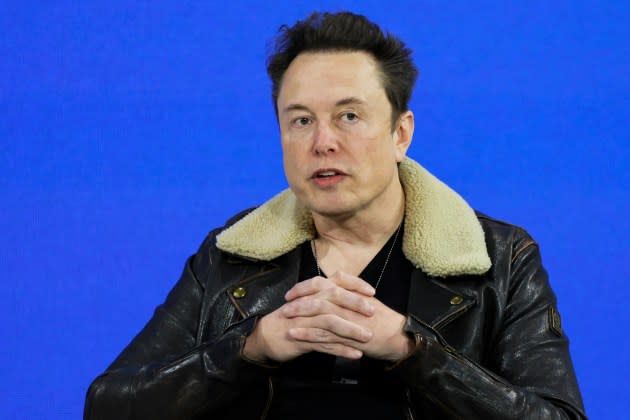Elon Musk Drove a 9,500-Percent Surge in Pizzagate Content
- Oops!Something went wrong.Please try again later.

In the recent chronicles of Elon Musk’s bizarre behavior, his tweets reviving the #Pizzagate conspiracy theory have been overshadowed by his endorsement of an antisemitic post, and the billionaire’s subsequent call for corporations that have pulled advertising from the X platform to “go fuck yourself.”
But Musk’s Pizzagate tweets had an astonishing effect, according to a new paper from researchers at Montclair State University in New Jersey. The academics charted a more-than 9,500 percent increase in Pizzagate traffic on X (formerly Twitter) in November compared to the previous month.
Pizzagate is the baseless, QAnon-adjacent conspiracy theory that a nefarious network of powerful pedophiles used the basement of a Washington, D.C., pizza parlor to traffic abducted children. This online fever dream was birthed by conspiracists who purported to decode hidden messages in hacked emails of former “Clinton 2016” campaign chair John Podesta. In Dec. 2016, a North Carolina man armed with an AR-15 stormed the parlor, Comet Ping Pong, seeking to “liberate” children from the restaurant’s “dungeon.” (The pizza joint doesn’t even have a basement.) Remarkably no one was hurt.
The Pizzagate conspiracy theory has since largely receded from the public imagination. That is, until the owner of X began stirring the pot last month. Musk’s interest in Pizzagate first surfaced in the context of his outrage at Media Matters, the watchdog group had called out X for allegedly placing corporate advertising against white supremacist and neo-Nazi content. (Musk has since sued Media Matters, alleging defamation.)
In a thread that began with Musk blasting Media Matters as “pure evil,” a commenter asserted that the watchdog group’s had previously been in a relationship with the owner of Comet Ping Pong, “yes,the Pizzagate restaurant.” Musk curiously replied: “Weird.”
Just a week later, Musk’s Pizzagate curiosity metastasized into active promotion of the theory. He posted a meme reading, in part, “Pizzagate is real,” while adding his own text: “Does seem at least a little suspicious.”
and he wonders why advertisers are running for the hills pic.twitter.com/cI4FzoZZxV
— nikki mccann ramírez (@NikkiMcR) November 28, 2023
As described by the researchers, the meme Musk posted “falsely suggests that there was a single person debunking the patently false PizzaGate conspiracy and that this individual person was recently convicted of sexually abusing children.” Musk later deleted that tweet.
The damage, however, was already done. In a paper titled “Everything Old Is Q Again,” the Montclair State academics documented that “Musk’s posts increased activity on X related to Pizzagate by 9501.5 percent from … the month prior.” The paper added that “the most viewed and liked posts…showed support for the PizzaGate conspiracy and came from verified accounts.” A similar analysis by the academics of Google Trends data charted an enormous surge of search traffic correlated to the timing of Musk’s Pizzagate tweets.
With just a pair of ill-considered tweets, the owner of X had summoned a destructive conspiracy theory from the depths like some kind of online Godzilla. The public reaction, the researchers argue, indicates that “receding conspiracies” are “better understood as dormant,” needing only a “prominent event” for “them to be reawakened.”
Rolling Stone interviewed the authors of the paper, Bond Benton a professor of communications, and Daniela Peterka-Benton, academic director the university’s Global Center on Human Trafficking. “The spike was incredible,” Benton says, calling Musk’s behavior “dangerous,” and the damage durable. “It will be amplified,” he says of Pizzagate, “and there will be people who take it seriously.”
Peterka-Benton underscores that the dark fascination around Pizzagate has, in reality, set back the cause of safeguarding vulnerable populations. “Pizzagate was a huge deal back in 2016 because it started to change the discourse about human trafficking in the United States,” she says. It gave Americans a mental model of “a little blonde haired girl that’s snatched away from a playground and then sold into an underground human trafficking ring. And that’s really not what the face of human trafficking is,” she insists.
Pointing to the more common harm suffered by marginalized women of color and undocumented laborers, Peterka-Benton argues: “Having these falsehoods out there is detrimental; it’s just been presented in a completely incorrect way.”
Benton says that as Twitter’s owner, Musk has “remarkable” and “outsized power” to shape the public discourse, but that he is using that authority with all the subtlety of a “monkey with a shotgun.”
The academic adds: “For some reason, Elon Musk feels that it’s completely fine to dabble in this. And that is very concerning.” He notes: “There are downstream effects of amplifying QAnon. When you boost one element of it,” as Musk has done, he says, “it legitimizes a lot of other conspiracies that are bundled with QAnon. It opens the door to a lot of extremist content.”
More from Rolling Stone
Elon Musk Marks Race to Bottom With Alex Jones, Ramaswamy, Andrew Tate in Live Twitter Chat
Elon Musk Reinstates Twitter Account of Conspiracy Kingpin Alex Jones
SNL Host Adam Driver Serenades Santa, Mocks Tesla Cybertruck Buyers
Best of Rolling Stone

